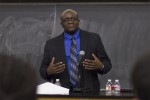The first candidate to visit UCLA for a new diversity vice chancellor position said at a forum Thursday that he would aim to involve the entire campus in his work and to lead a collective effort to promote an inclusive environment. The candidate, Franklin Tuitt, said he thinks the position is symbolic in nature and would only be successful if backed by leaders across UCLA.
Tuitt, an associate provost for inclusive excellence and associate professor of higher education at the University of Denver, is one of four individuals selected as finalists for the new vice chancellor position for equity, diversity and inclusion to meet with the UCLA campus community. He earned his master’s degree in administration, planning and social policy from Harvard University and his bachelor’s degree in human relations from Connecticut College.
UCLA Chancellor Gene Block announced the creation of the position in December 2013 after the Moreno report found that UCLA’s policies and procedures for addressing reports of racial discrimination among faculty were inadequate. The new vice chancellor is tasked with organizing different resources and initiatives on campus to create a diverse, inclusive and equitable climate.
As part of the search process, a search committee is holding forums and interviews for each of the final four candidates for the position. About 60 people attended the forum Thursday.
At the event, Tuitt said he is worried the vice chancellor position will be filled by someone who thinks problems addressed by the Moreno report can be solved in one step by one person.
He said he thinks the officer who holds the position should be a part of a larger collection of people working together to extend diversity, inclusion and equity to all corners of the campus. The future vice chancellor, he said, should be someone who supports everyone else in this network.
About eight people stepped up to the microphone to ask Tuitt his opinion on activism and accountability. They also asked for his thoughts on the new vice chancellor’s role and campus resources, issues of retention and increasing the university’s diversity while working with Proposition 209, a California law that prohibits state institutions from taking race into account during the admissions or hiring process.
Tuitt said he is not sure about the resources that will be available to the future diversity chancellor and he intends to ask Block and Executive Vice Chancellor and Provost Scott Waugh before his visit ends.
UCLA faculty members are currently set to vote on an academic requirement that would have students take one course while at UCLA that addressed diversity issues.
Tuitt said he thinks a diversity course requirement is only one of many ways an institution can address what he said is a lack of diverse experiences available to students. He added that he thinks the diversity requirement is necessary at UCLA because he thinks course curricula do not currently integrate enough diverse experiences.
He added that he thinks if students are able to attend UCLA without encountering perspectives different than their own, then the university is not sufficiently representing different communities. Tuitt talked about his own experiences as a student and administrator who was a minority on campus. He said he would sometimes go for days without seeing another black man and felt culturally and socially isolated.
Tuitt also addressed how he thinks institutions should work to create trust in their community.
An institution must be accountable for its failure to present an inclusive environment, Tuitt said. He added he thinks institutions must hold themselves responsible for their participants’ experiences.
For example, Tuitt said he was disappointed in an institution he worked for when other administrators failed to be accountable when a student reported that he was racially profiled. Tuitt said the school failed to understand the student and his mother’s concerns.
“I’m struck by and constantly amazed at how hard it is for us to accept other people’s reality,” Tuitt said.
He added that he was surprised the Moreno report qualified people’s experiences with discrimination as “perceived.”
He said he thinks the report’s wording caused it to deny the reality of the experiences it documented. He added that he thinks the decision was made so that the document would be viewed as unbiased.
Some alumni who said they represented Jewish students’ interests at the forum asked Tuitt what he would do to protect Jewish students in response to recent resolutions calling for the divestment from companies that some say contribute to human rights violations against Palestinians. They also asked him how he would respond to protests and academic boycotts on campus.
Tuitt said he would not support a ban on protests that targeted Jewish students or demonstrations started by Jewish students, but would condemn actions that harm, threaten or prevent any student’s opportunity to learn.
“I would not be standing here interviewing for this position if folks didn’t engage in activism,” Tuitt said. “I have to support the right to do that to the extent that it doesn’t threaten the welfare of members of this community.”
An open forum with the next vice chancellor finalist, Octavio Villalpando, will be on Thursday. Villalpando is the associate vice president for equity and diversity and a professor of educational leadership and policy at the University of Utah.
The other two finalists will be announced by Feb. 9 and Feb. 12 when they visit campus.
